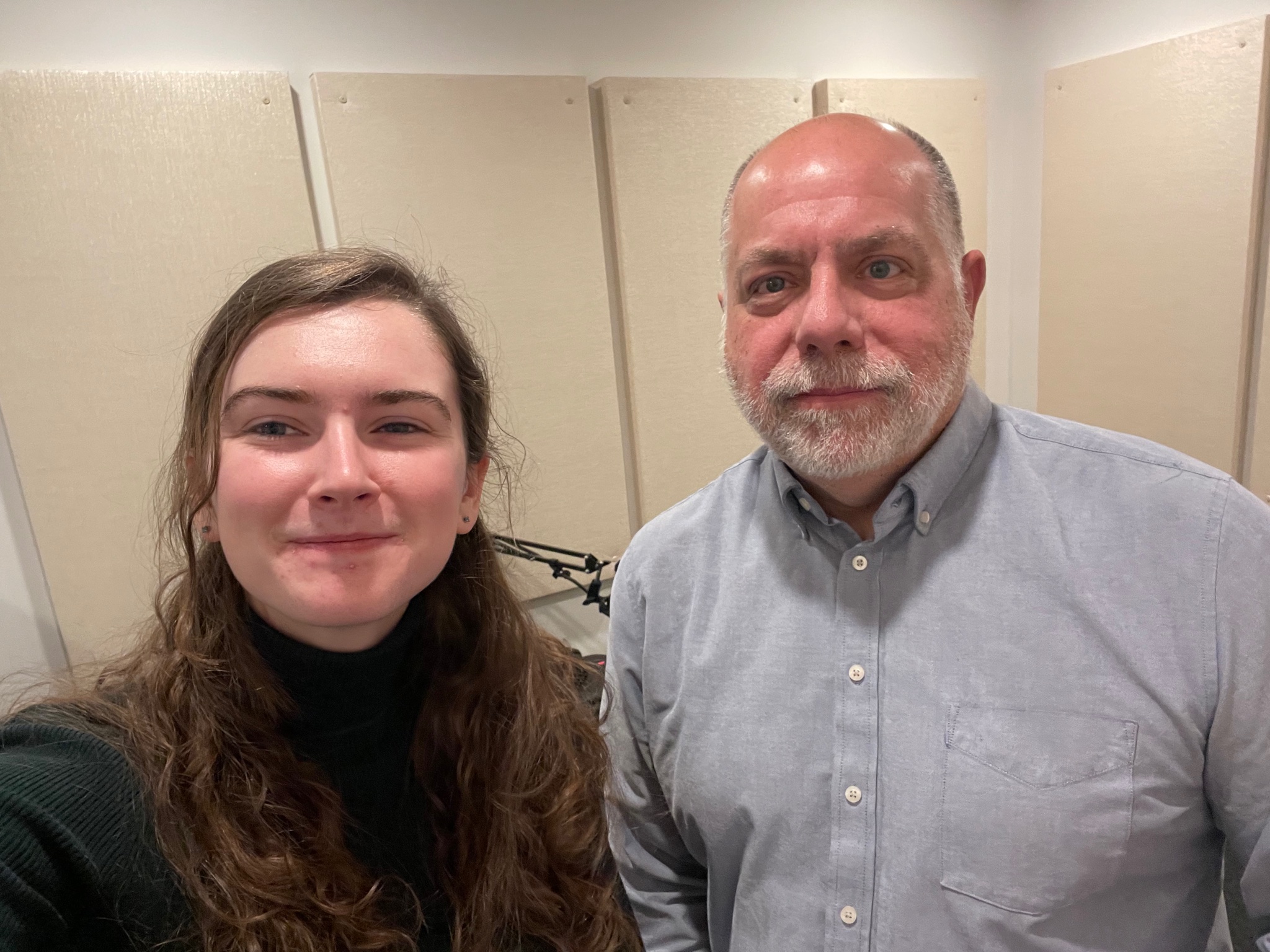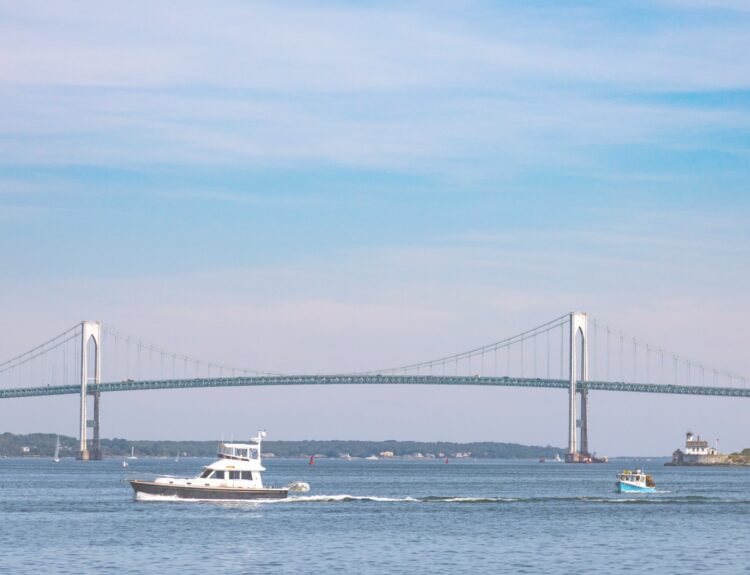Originally published by ecoRI News, a nonprofit newsroom covering environmental news in Rhode Island. Read more at ecoRI.org
This transcript was edited for clarity and length. Listen to the full podcast.
Colleen Cronin
Welcome to the Blab Lab, a monthly podcast from reporters of ecoRI News where we unpack the critical environmental issues facing southern New England. I’m reporter Colleen Cronin and today I’m here with a special guest, Terrence Gray, the director of the Rhode Island Department of Environmental Management. DEM is charged with everything from forest management to issuing fish and hunting licenses, testing our recreational beaches and ponds, and helping the state fulfill some of its Act on Climate goals. We’ll be having Terry on the show once a month to talk about the latest environmental news and our progress toward goals like emissions reductions, conservation, and air quality.
Hi, Terry.

Terry Gray
Hi, Colleen. Pleasure to be here this morning.
Colleen Cronin
Thank you so much for coming on. We’re so excited to have you. Before we dive into some questions, I know a lot of our listeners know who you are already and know what DEM does. But something I love to do is just ask, you know, important people what they do and what their organizations do in their own words.
Terry Gray
DEM is a pretty big organization. And it’s got a pretty wide responsibility across Rhode Island. So, it kind of gets broken into three big boxes. One box is environmental protection, which really works to ensure clean water, clean air, and responsible site cleanup, a lot of land management issues. Then the second box is natural resources, stewardship. So that’s the parks, the beaches, fish and wildlife, marine fisheries, even running the Port of Galilee, down in Narragansett. And then the third box is local food and agriculture. So, we have a role to really support and advocate for local farms and connect the food that’s caught and grown in Rhode Island to people’s plates.
Colleen Cronin
That’s a lot on the plate. And what would you say your role in all that is?
Terry Gray
Well, my role is really to support our teams. We have a lot of teams throughout the department, some excellent employees that are really dedicated to our mission, several of them that have decades of experience. So, my role is really to support them to work with the governor’s office, to work with elected officials to really provide a lot of leadership support in the director’s office to make the magic happen at the program level.
Colleen Cronin
Yeah, I’ve seen you at the Statehouse a lot. And I always get press releases about all the things you’re doing. So, seems, seems like a busy job.
Terry Gray
It is busy. And there’s a lot of different things and it’s a type of job where you have to change gears quickly. So, there’s a lot of different responsibilities, like we said, and sometimes I’ll go from a meeting on clean air to a meeting on marine fisheries, to a meeting on building a new building at one of our parks. And you just have to shift quickly.
Colleen Cronin
You’ve been at DEM in this role two and a half years. You’ve done a lot of different things at DEM.
Terry Gray
Yeah, it’s crazy. I’ve been there for 37 years. So, I started in 1987, as an inspector in the hazardous waste program right out of college, and I had a chemical engineering degree. I knew nothing about industry, but really got kind of a firsthand look at a lot of different businesses in Rhode Island and how they manage their chemical wastes. And then kind of moved up through the ranks over time and got experience in a lot of different programs, mostly in the environmental protection world. And it’s been a great career, great experiences all the way along.
Colleen Cronin
In the last 2½ years in your role as director, are there some accomplishments or goals that you’ve been especially proud of?
Yeah, it was interesting, 2½ years ago, we had we were coming out of the pandemic, of course, we had a new governor. And our previous director, Janet Coit, had been at DEM for 10 years. So, we were pretty stable at that point, then everything kind of got shook up a little bit. And moving into the new role, I really had to learn a lot about the agriculture and natural resources worlds. And I also had to rebuild our team. And I’m really proud of some of the people that we recruited and brought into the DEM team over that time. We also had to kind of reboot and develop a strategic plan. And that, I think, provides a real direction for the department going forward. And I’m proud that it’s really got a particular focus on environmental justice and environmental equity. And the concept of making sure that every community can enjoy the benefits of the programs and the protections that we offer is something that’s really important to me.
Colleen Cronin
So those have been some of your biggest accomplishments. What do you think have been some of the biggest challenges?
Terry Gray
I think the biggest challenge was going back to April of 2021, where the legislature passed and Gov. McKee signed the Act on Climate. So that really was a game changer for Rhode Island in our response to climate change. We had mandates and plans and really had to focus on reducing greenhouse gas emissions across the entire economy. It’s been a great challenge. I’ve enjoyed it, it’s been a huge lift. But it’s um, it’s really kind of a whole new dimension to DEM’s work.
Colleen Cronin
And looking more specifically at climate change, what do you think are the biggest obstacles for the agency?
Terry Gray
I think when we look at climate change, we’re looking at breaking our economy into kind of three big boxes. There are emissions from transportation, which is probably the biggest box, but I actually think we have a pretty good handle on some strategies to deal with that. Then we have the power sector. And then we have the building sector. And I think the biggest challenge may be the building sector. We have a lot of old buildings, we’re focused on building a lot of new buildings, we need to make sure climate considerations are taken into account in all of those.
Colleen Cronin
And I know, climate change is going to be a big part of what you guys are doing in the next couple of years or maybe next couple of decades, but outside of climate issues, what do you think is the agency’s biggest challenge?
Terry Gray
I think it’s just making sure that our parks program is presenting an experience that’s really good for all of our visitors, we’ve really been focused on increasing the staffing capacity within the parks office. But also, we’ve been looking at a lot of the buildings and structures in our parks, some of them are old. There’s a lot of deferred maintenance. So, we really have to focus on kind of modernizing those and improving those. And that’s been a handful.
Colleen Cronin
Yeah, there’s so many different ways that DEM is involved in environmental issues. But is there a specific role that you feel like it will play going forward? And how would you like to see the agency grow or change to accomplish those goals?
Terry Gray
Well, the role I love to see is the lead by example role. And we really want to lead by example in how an agency can take on climate change, both in terms of reducing our own greenhouse gas emissions, but also making sure that our facilities are resilient for climate change going forward. I want to lead by example in sustainability. And we’ve been doing a lot of work on that. And then some basic good government principles like customer service, transparency, and responsiveness. I want DEM to lead the pack on that on those issues as well.
Colleen Cronin
Yeah. Moving on to what’s been in the news recently, ecoRI and specifically my colleague, Rob Smith, has written about the exclusion of conservation funding from the governor’s green bond proposal. And I know that land trust folks and some conservation folks were kind of concerned about that. What was your reaction to the governor’s green bond proposal?
Terry Gray
So that’s a hot topic. And when you go back, you look at the whole process on how we put together these bond proposals, so, that was something that was submitted to the to the governor into the budget office back in September, as part of our capital budget. And that’s a wish list, right? And all of the agencies across state government do that. And there’s probably billions of dollars in requests, and the budget office has some tough choices to make. And they have to decide what’s going to make the cut, what’s going to go into bonds, there’s only so much funding that the state can afford, so they have to manage that too. And not all of us get everything that we want. So sure, I was a little disappointed to see that the land use, or excuse me, the land conservation money wasn’t in the final proposal. But that doesn’t mean we’re not going to conserve land. It just means that there’s no funding in the bond as proposed. And that’s going to limit our ability, but it’s not going to stop us.
Colleen Cronin
Off of that, and maybe a little bit of a harder hitting question from Frank Carini, who you can thank for this, because he asked me to ask you this: Do you think the green bond ballot questions are beginning to veer from environmental protections and conservation to other projects that are maybe less green and grayer?
Terry Gray
That’s a good question. And I can always count on Frank for a hard-hitting question, right. But I think the questions on the green bond have evolved, and they changed. And it sort of has tracked the way that a lot of the challenges that we’re facing at the department have changed and evolved over time. We’re not dealing with the same level of pollution control challenges that we did 30 years ago. We’re looking at things like climate change, we’re looking at land conservation, we’re looking at farmland preservation there. There are different types of challenges. Right now, this climate resiliency is in the green bond. That wasn’t something that we would have even thought about, you know, 20 years ago. So, times are changing.
Colleen Cronin
And thinking about those times changing and looking forward, is there anything that’s coming up for DEM that you’re especially excited about in the next year or so?
Terry Gray
I think just looking at the improvements that we have planned at the Port of Galilee. One of our missions is supporting the Rhode Island commercial fishing industry. And through the governor and the budget, we’ve invested a huge amount of money into the Port of Galilee. We’ve improved all the bulkheads. We’re improving the docks; it’s going to be really nice. And I think we’re already starting to see the benefits of that where a lot of the businesses that that support commercial fishing, like the fish processing industries, are already investing in expanding their operations.
Colleen Cronin
Yeah. Is there any climate resiliency part of that as well?
Terry Gray
Yeah, yeah, that’s a good point. So, in the last two storm events, Galilee has been flooded. And when we’re replacing the bulkheads in the docks, we’re raising the elevations to deal with anticipated sea level rise. But we still have to deal with storm surge. And then a lot of that comes in from the ocean side down near George’s and Salty Brine beach. So, we really have to look at design. Is the port hardy enough to deal with the ocean that’s going to come in every once in a while? Yeah.
Colleen Cronin
Yeah, that’s something everyone has to think about looking forward, how climate change is going to impact it. Another forward-looking question, and our last question for this episode. Do you have any favorite hiking spots, suggestions for listeners? I know you’re a big hiker.
Terry Gray
Yeah, my favorite hiking spot is on Tillinghast Pond Management area in West Greenwich. It’s a favorite because it’s pretty near my house. But it’s also a favorite because it’s such a beautiful spot. It’s been conserved. Between the West Greenwich Land Trust, The Nature Conservancy, DEM, and the town of West Greenwich, they’ve put a lot of effort into expanding the trail system up there. So, there’s over 11 miles of trails now. There’s an easy loop around the pond, which is two-plus miles. But you can go all over the place, and it connects with Wickaboxet. It connects with Arcadia. It’s a really great spot.
Colleen Cronin
I’m going to add it to my to do list.
Terry Gray
All right.
Colleen Cronin
Thank you so much, Terry, for coming on the show today. We really appreciate it.
Terry Gray
Oh, you’re welcome. It’s going to be fun.
Colleen Cronin
I think so, too. And thank you so much for our listeners for following along. If you have any questions you’d like to ask Terry or any ideas for podcasts in the future, feel free to email me at colleen@ecori.org. We want to thank Vanessa Carlton for letting us use her song “Willows” for our theme song, which you hear at the beginning and end of every episode. Thanks also to Jo, our editor and publisher, for editing and mixing the episode and fixing all of my editing mistakes. For more Rhody environmental news, you can visit us at ecoRI.org.





